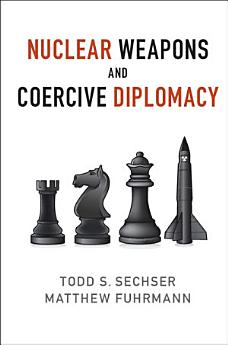Nuclear Weapons and Coercive Diplomacy
sij 2017. · Cambridge University Press
E-knjiga
349
str.
reportOcjene i recenzije nisu potvrđene Saznajte više
O ovoj e-knjizi
Are nuclear weapons useful for coercive diplomacy? Since 1945, most strategic thinking about nuclear weapons has focused on deterrence - using nuclear threats to prevent attacks against the nation's territory and interests. But an often overlooked question is whether nuclear threats can also coerce adversaries to relinquish possessions or change their behavior. Can nuclear weapons be used to blackmail other countries? The prevailing wisdom is that nuclear weapons are useful for coercion, but this book shows that this view is badly misguided. Nuclear weapons are useful mainly for deterrence and self-defense, not for coercion. The authors evaluate the role of nuclear weapons in several foreign policy contexts and present a trove of new quantitative and historical evidence that nuclear weapons do not help countries achieve better results in coercive diplomacy. The evidence is clear: the benefits of possessing nuclear weapons are almost exclusively defensive, not offensive.
O autoru
Todd S. Sechser is Associate Professor of Politics at the University of Virginia, where he is an expert on international security issues.
Matthew Fuhrmann is Associate Professor of Political Science and Ray A. Rothrock '77 Fellow at Texas A & M University.
Ocijenite ovu e-knjigu
Recite nam što mislite.
Informacije o čitanju
Pametni telefoni i tableti
Instalirajte aplikaciju Google Play knjige za Android i iPad/iPhone. Automatski se sinkronizira s vašim računom i omogućuje vam da čitate online ili offline gdje god bili.
Prijenosna i stolna računala
Audioknjige kupljene na Google Playu možete slušati pomoću web-preglednika na računalu.
Elektronički čitači i ostali uređaji
Za čitanje na uređajima s elektroničkom tintom, kao što su Kobo e-čitači, trebate preuzeti datoteku i prenijeti je na svoj uređaj. Slijedite detaljne upute u centru za pomoć za prijenos datoteka na podržane e-čitače.




